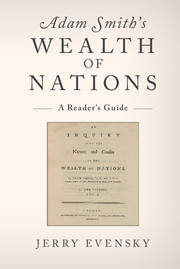Book contents
- Frontmatter
- Contents
- Acknowledgments
- Prologue: The Purpose of This Work
- 1 Adam Smith's Moral Philosophical Vision: The Context of His Economic Analysis
- 2 The Wealth of Nations: Book I
- 3 The Wealth of Nations: Books II and III
- 4 The Wealth of Nations: Book IV
- 5 The Wealth of Nations: Book V
- Epilogue: Adam Smith and Laissez-Faire
- References
- Index
Epilogue: Adam Smith and Laissez-Faire
Published online by Cambridge University Press: 05 September 2015
- Frontmatter
- Contents
- Acknowledgments
- Prologue: The Purpose of This Work
- 1 Adam Smith's Moral Philosophical Vision: The Context of His Economic Analysis
- 2 The Wealth of Nations: Book I
- 3 The Wealth of Nations: Books II and III
- 4 The Wealth of Nations: Book IV
- 5 The Wealth of Nations: Book V
- Epilogue: Adam Smith and Laissez-Faire
- References
- Index
Summary
The Wealth of Nations is a stupendous palace erected upon the granite of self-interest. … The immensely powerful force of self-interest guides resources to their most efficient uses, stimulates labourers to diligence and investors to splendid new divisions of labour, in short, it orders and enriches the nation which gives it free rein.
George Stigler (Stigler, 1975, 236)If, as Stigler asserts, Smith believes that “self-interest … orders and enriches the nation which gives it free rein,” then clearly Smith must believe that the optimal government policy is laissez-faire.
Among the very best, full-length arguments for interpreting Smith as an advocate for laissez-faire is James Otteson's Adam Smith, published as Volume 16 in the series “Major Conservative and Libertarian Thinkers.” Therein Otteson writes:
The baseline for a Smithian state is quite limited: protections of person, property, and voluntary contract, punishments for attacks on person or property or breach of contract, and – little else. … Because Smith believes history shows that people do better under conditions of limited government, the strong presumption will be against third party interposition into human affairs and in favor of allowing individuals to find their own ways. … [H] e thus recommends a largely – though not completely – laissez-faire state. … [But Smith's] liberalism … is pragmatic: he is willing to allow for exceptions to the default presumptions if there are specific cases in which local circumstances warrant it. (Otteson, 2011, 81)
Otteson's case for Smith as an advocate for laissez-faire is based in part on three complementary arguments that he finds in Smith's work:
The “Local Knowledge Argument” maintains that “everyone has unique knowledge of his own ‘local’ situation” so a distant other (e.g., the proverbial “Government bureaucrat”) is by definition less informed to make “local” decisions (Otteson, 2011, 98).
- Type
- Chapter
- Information
- Adam Smith's Wealth of NationsA Reader's Guide, pp. 253 - 266Publisher: Cambridge University PressPrint publication year: 2015



